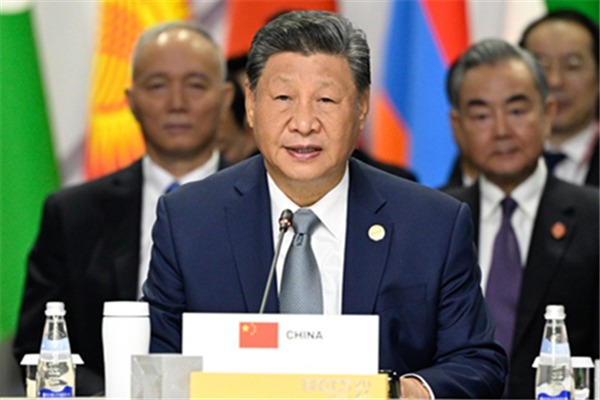US academic hails China's green advancements
Bruce Usher, a climate change expert, sees remarkable progress in the country's renewable energy and electric vehicle sectors, highlighting its rapid technological innovation and investment in the low-carbon economy. Liu Yifan reports in Hong Kong.


Bruce Usher, a professor at Columbia Business School and author of Investing in the Era of Climate Change, hailed China's progress in the green economy and called for closer global cooperation to address headwinds of tight carbon deadlines, geopolitical tensions and education on climate issues during his visit to the country.
Usher has been studying climate change for more than 20 years. He teaches climate courses that focus on commercialization and investment for green business.
Before joining Columbia University, Usher led UK-based EcoSecurities Group, which developed greenhouse gas emission reduction projects in developing countries, to an Initial Public Offering in 2005.
During his trip to China last month, Usher visited Shanghai, Shenzhen, and Hong Kong successively to meet with companies and universities. Among his stops were Longi Green Energy Technology, the world's largest solar company, and BYD, the top-selling electric carmaker globally.
From the financial veteran's vantage point, what's happening there presents a contrast to two decades ago when there were no solutions to climate issues globally and very little investment: renewable energy was very expensive and there were no electric vehicles (EV).
"Now in the Chinese mainland and Hong Kong in 2024 so much technology, right?" Usher said in an interview with China Daily.
"Solar power is widespread and very cheap. Technological innovation in China is incredible. Now there are a lot of investments because there is innovation to invest in."
Growing green economy
In 2020, China announced a set of targets to reach peak emissions by 2030 and carbon neutrality by 2060.
According to a report by the Finland-based Centre for Research on Energy and Clean Air, China's clean energy sector was the largest contributor to the country's economic growth last year, accounting for 40 percent of its expansion.
Clean energy, including renewable energy sources, EVs, electricity grids, and energy storage, made up 9 percent of the GDP of the world's second-largest economy in 2023. This figure represents an increase from 7.2 percent in the previous year.
The findings highlight the magnitude of China's investment in the renewable energy infrastructure, amounting to $890 billion last year, nearly on par with the global investments made in fossil fuel supplies for 2023.
As the country's prime gateway linking the mainland with the rest of the world, the Hong Kong Special Administrative Region has also been ramping up efforts to attach a green label to its global financial hub status amid a worldwide drive for climate change.
Official figures show the total amount of green and sustainable bonds issued in Hong Kong exceeded $80 billion in 2022, accounting for one-third of those issued in the entire Asian region. Over 200 environmental, social, and governance funds with assets under management of $159 billion were authorized as of September 2023.
Financial Secretary Paul Chan Mo-po this February unleashed several initiatives in his 2024-25 Budget to foster a low-carbon economy. One key priority is to formulate sustainability disclosure standards and roll out a "road map" and a "vision statement" to help businesses and financial institutions in sustainability reporting and the analysis of relevant data.
Usher applauded these measures, saying the reporting of environmental data is "very important for investors". Unlike financial data reporting, which has been highly standardized for a long time, sustainability reporting lacks clear rules and standardized metrics, he added.
Usher said a big advantage for the mainland and Hong Kong compared to other regions is that Chinese business moves very fast given the competitive market. Take the electric vehicle sector: Chinese EV makers are facing brutal competition and price wars to scramble for market share. The introduction of new vehicles by emerging players like Xiaomi, a smartphone maker, also presents a risk to established players.
"If you don't move fast, you are falling behind," Usher said. "In the US, there's competition, but a little bit less. In Europe, even less competition."
Promoting global cooperation
For Usher, the primary problem on the climate issue is time, because the world has to reduce emissions everywhere, which requires more concerted efforts to go much faster and much harder.
According to the Emissions Gap report published by the United Nations in November, which evaluates countries' commitments to addressing climate change in comparison to what is required, it is projected that the world will experience a temperature increase of 2.5 to 2.9 degrees Celsius above preindustrial levels if governments do not enhance their climate action efforts.
In the event of a 3-degrees-Celsius increase in the global temperature, climate scientists predict that the world may exceed crucial thresholds, resulting in irreversible outcomes like uncontrolled ice sheet melting and the drying out of the Amazon rainforest.
In addition, the geopolitical situation is not helping, Usher noted. Last month, the European Commission said it would levy additional tariffs ranging up to 38.1 percent on Chinese electric cars starting in July. This move followed the Biden administration's decision to quadruple duties for Chinese EVs to 100 percent in May to boost domestic manufacturing and jobs.
Usher, who is quite positive as far as climate-related technology and investment is concerned, has been a proactive practitioner in promoting cooperation on green development, not on politics but on education.
During his stay, he canvassed Chinese universities' opinions on the Open Climate Curriculum, an artificial intelligence-powered tool for making climate course syllabuses and materials. The free AI tool, which pools teaching resources from business schools, aims to promote the sharing of educational materials and help faculties across the globe with teaching climate courses.
"If we can make it easier for professors to teach climate change, more will teach, and more students will graduate with knowledge," he said.
"So that's the idea. On this topic we should share, because we are all trying for the same goal. It's not a competition. We all have the same problem, climate change," Usher said.
Contact the writer at evanliu@chinadailyhk.com
- China adds over 10 million new urban jobs in Jan-Sept
- Child trafficker sentenced to death
- Chinese researchers advance understanding of mechanisms behind allergic diseases
- Expedition extends known length of Asia's longest cave to 437 km
- China's top political advisor stresses forging strong sense of community for Chinese nation
- Harvest season of late rice begins in South China




































